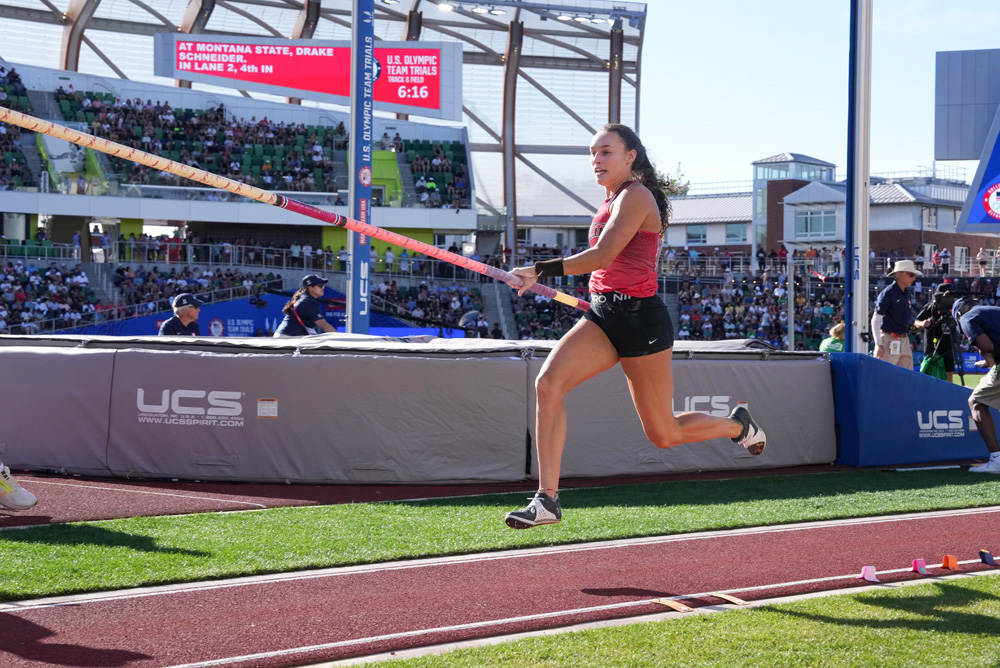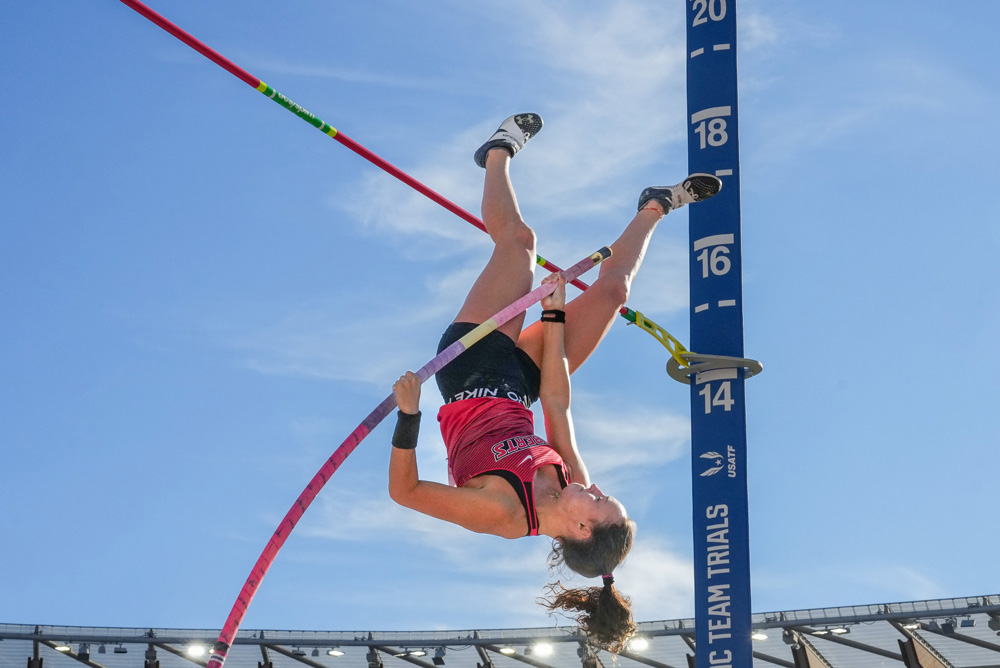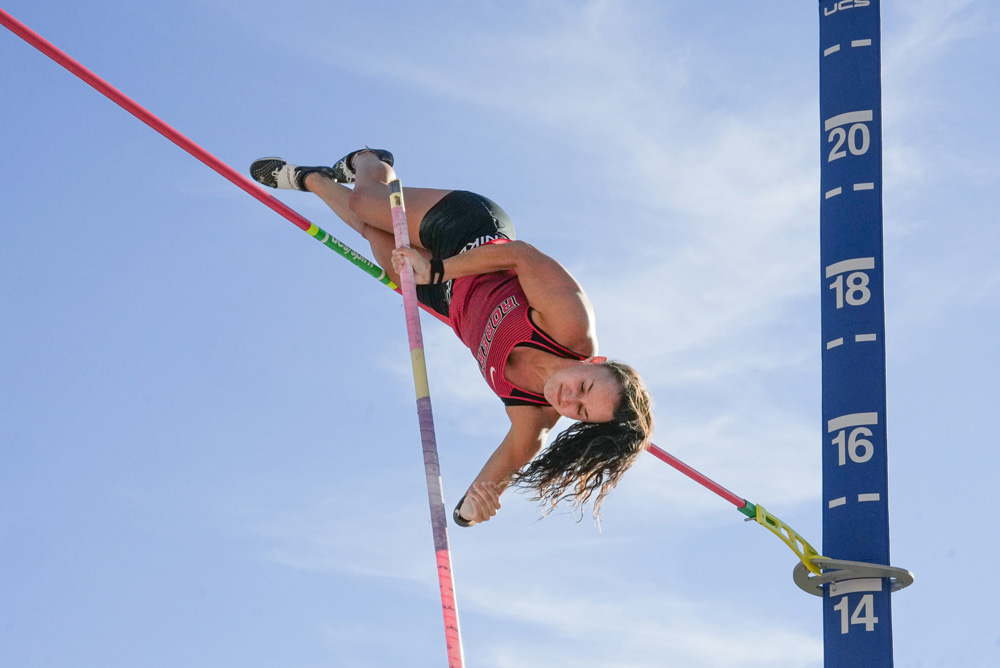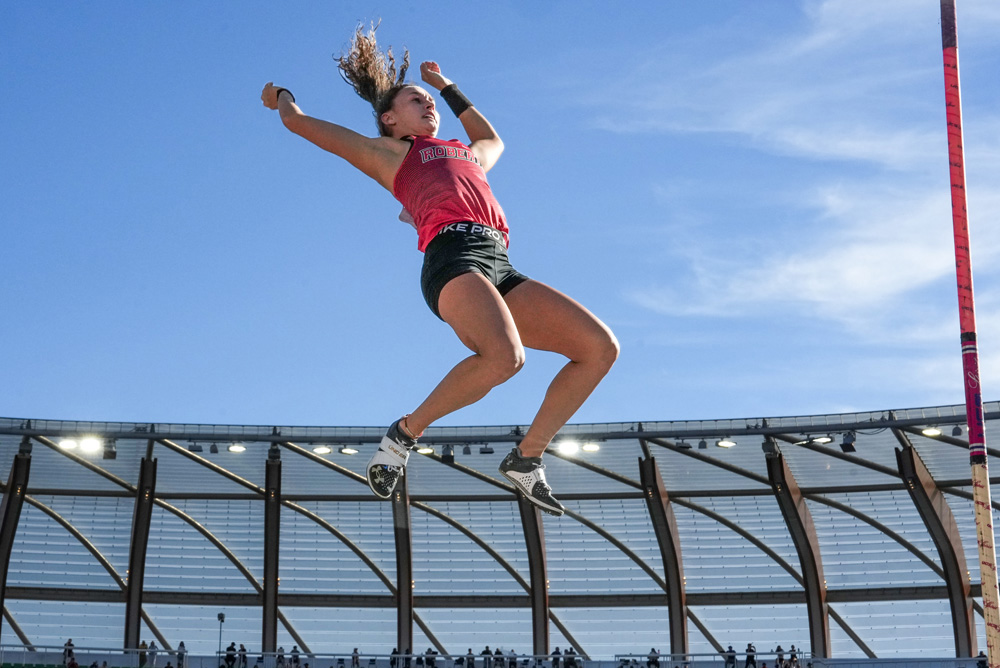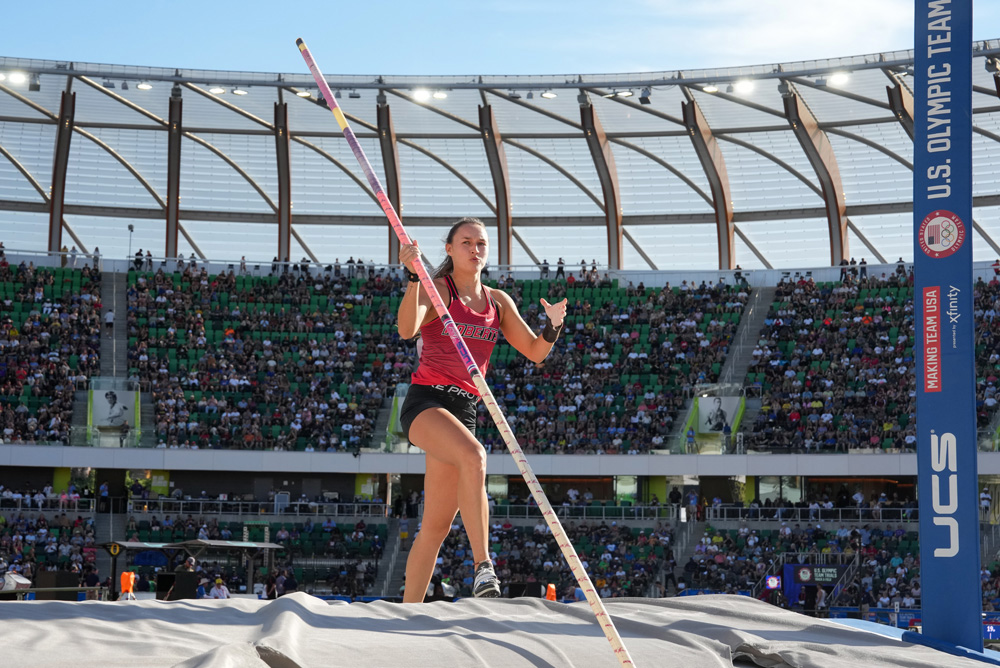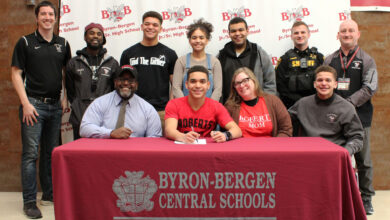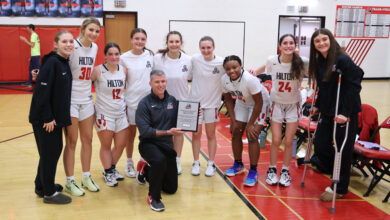Roberts Wesleyan’s Brynn King makes U.S. Olympic pole vault team
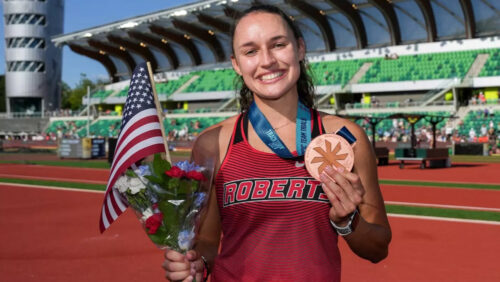
by Steve Bradley, Roberts Wesleyan University Athletics Communications Consultant
Brynn King has never been to Paris, but the Roberts Wesleyan University pole vault standout is headed there this summer.
King cleared a career-best 4.73 meters (15-feet, 6 1/4-inches) soaring from eighth place to third at the U.S. Olympic Trials at the University of Oregon’s historic Hayward Field on June 30 to earn a coveted spot on the U.S. Olympic team and a trip to France for the 2024 Paris Games.
“I was so excited,” said King, who topped her previous best by five centimeters. “At that point I did not know that it put me on the team, but I knew that it was a PR (personal record), I knew it gave me a good shot and I knew that it put me back in the meet where I would be able to take three attempts at the next bar.”
King didn’t need them.
The Woodlands, Texas, native secured a place on the U.S. squad when 2016 Olympic silver medalist Sandi Morris missed all three of her attempts at 4.73 meters, leaving King, Bridget Williams, and 2020 gold medalist Katie Moon as the last three vaulters in the original field of 24 standing.
King joins her coach, Roberts assistant coach and pole vault coordinator Jenn Suhr, as an Olympian. Suhr, a 2004 Roberts graduate, is a three-time Olympian who won gold in 2012 and silver in 2008.
“I don’t even know how to describe it,” Jenn Suhr said. “One minute you are thinking that we might be out of it and the next thing you know, she is on the team. These are the underdog stories that people love to see, and they are the stories that are amazing to be a part of.”
King made her first attempt at 4.28m (14-0 1/2) on Sunday and passed at 4.43m (14-6 1/4) before clearing 4.53 meters (14-10 1/4) on her second jump to advance to the final eight.
After missing her first attempt at 4.63m (15-2 1/4), King leaned heavily on the advice of Rick Suhr, Jenn’s husband and former coach who was seated in the front row, to change strategies on the fly while adding another chapter to her inspirational story.
“I’ve made (4.73) once in practice,” King said during a phone conversation in between her victory lap and the medal ceremony. “I trust Rick and I knew that I just had to sit there and wait. He knew what was best for me, I knew that I had to keep my nerves down and just listen to exactly what he said and that was what I was trying to do
“I kept walking over, listening to him and repeating what he was saying in my mind. He told me from the beginning that he knew that I had it today and to believe in him, even if I didn’t believe in myself, and that’s what I tried to do.”
King passed on her final two attempts at 4.63 and, with three vaulters who had already met the Olympic standard clearing 4.68m (15-4 1/4) before her turn, King passed again knowing that she would need to make 4.73m, in order to qualify for the Olympics, anyway.
“She missed at 4.63 on her first and then we had to play the game,” said Jenn Suhr, who is the only woman to win the U.S. Olympic pole vault trials three times. “Whether she made it at 4.63 or 4.68 didn’t matter. We knew that she had the pole and the grip to make 4.73.”
“I didn’t want to waste energy on jumps, so (Rick Suhr) was telling me whether to pass depending on who made it,” King added. “When he told me to pass, I told myself that my priority was to not think about it, don’t make your own decisions, to just sit there, listen and absorb what he is saying and do exactly what he says.”
King executed the plan perfectly, clearing 4.73 on her first attempt after Morris opened the door with a miss on her initial effort.
“The moment that she missed, I turned around and was like, ‘All right, this is my opportunity to get in there and steal it,’” King said. “I was like, ‘This is my time, let’s go.’ I jumped good in warm-ups and I was on big poles, so I knew that when I cleared that bar that I was in the meet and I had a chance to keep fighting for my spot. It was kind of crazy.”
“To pass two consecutive bars and to have to PR by five centimeters to make the Olympic team, nobody’s ever done that,” Rick Suhr said. “It’s just surreal.”
King missed one attempt at 4.78 meters (15-8 1/4), but with her dream realized she became overwhelmed with emotion and decided to stop jumping for the night. She planned to celebrate by enjoying Voodoo Doughnuts with her biggest fan, 14-year-old sister, Camryn.
The U.S. Olympic Trials is widely considered the most difficult meet in the world. The field starts with 24 qualifiers and is cut in half after the first round. To make the Olympic team an athlete must finish in the top three and have met the Olympic standard within the past year.
“It’s the only place where third is first,” Rick Suhr said. “It does not matter. You have to play your cards to finish third. We had just enough training and just enough time to make that bar. She made that thing clean and the place went ballistic.”
While history will show that King qualified for the Olympic Team on Sunday, June 30, 2024, Rick Suhr believes otherwise.
King advanced to Sunday’s competition after qualifying in a three-way tie for 11th on Friday, June 28. She cleared 4.35m (14-3 1/4) on her first try but was unsuccessful on three attempts at 4.5m (14-9).
“We did not look good,” Rick Suhr said.
So, while others were taking a break from training on Saturday, King and Rick Suhr, who is a volunteer assistant at Roberts, went to the Lane Community College track to practice takeoffs and grips. They were the only people there.
“That’s where she made the team,” Rick Suhr said. “We were the only ones out there for an hour and a half. We had to get it right and we figured it out. We had our strategy and it didn’t matter whether we finished 13th or fourth, we had to take our shot.”
And they made it.
“It’s that dedication and that work ethic,” Jenn Suhr said. “It’s also the magic that Rick has as a coach. He took a broken athlete and got her to believe in herself and to believe in him.”
The Olympic berth caps a record-breaking first year at Roberts for King, who transferred from Duke University, where her career-best was 13-11 1/4. She set the NCAA Division II indoor record (4.41m), breaking a 14-year-old mark, in her first meet as a Redhawk on December 1, 2023. She broke her own record seven times, including an effort of 4.65m (15-3) while becoming the first Roberts Wesleyan student-athlete to win an NCAA championship on March 8 in Pittsburg, Kansas.
She was named East Coast Conference Indoor Track and Field Women’s Athlete of the Year, first-team All-America, United States Track & Field and Cross Country Coaches Association Division II East Region Women’s Field Athlete of the Year, and USTFCCCA DII National Women’s Field Athlete of the Year.
She picked up where she left off after her historic indoor season, setting a Division II outdoor record by clearing 4.60m (15-1) at the Redhawk Invitational on March 14, just six days after she won the indoor national championship.
King followed that up with another record-breaking performance at the Texas Relays on March 30, setting a meet and NCAA Division II record by clearing 4.68m (15-4 1/4) in her home state.
She also broke a 13-year-old meet record (4.51m, 14-9 1/2) by winning the Kansas Relays on April 19. King then shattered the East Coast Conference record by four feet (15-1) on May 2.
King was named the ECC Outdoor Track and Field Female Athlete of the Year on May 17 and took first place in the 2024 adidas Atlanta City Games a day later with an effort of 4.54m (14-10 3/4).
King made history again five days later, winning her second NCAA Division II championship at Emporia State University. After missing on her first two attempts, King rebounded to set meet and facility records while clearing 4.60m (15-1). She is the first student-athlete from the East Coast Conference to win multiple individual NCAA titles.
She was named First-Team All-America by the USTFCCCA and East Region Division II Field Athlete of the Year on June 3. She received the Jerry Flynn Award Area College Athlete of the Year Award from the Rochester Press-Radio Club on June 11.
King, who was scheduled for several hours of Olympic processing on Sunday night – including trying on Team USA gear for the first time – plans to return to Rochester to continue training before leaving for the Olympics, which begin on July 26.
“I’ll have to stay away from the croissants and stuff until I’m done, but after that it will be all me,” she joked.
Photos courtesy of Kirby Lee, USA Today
